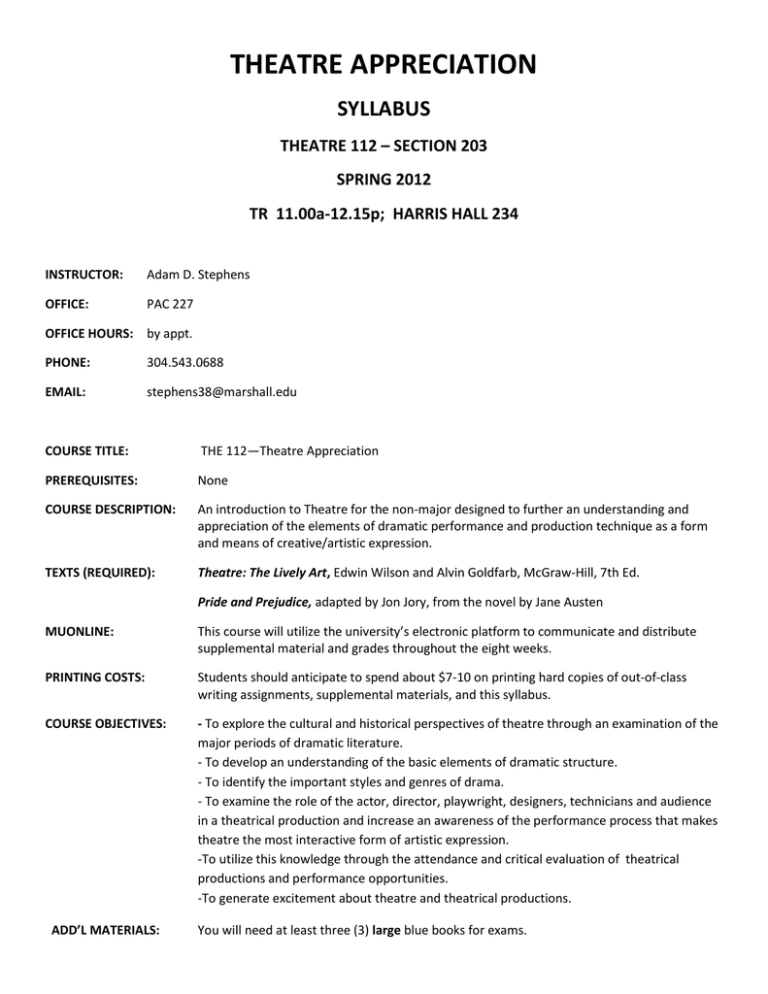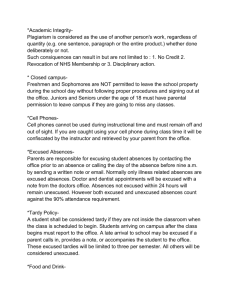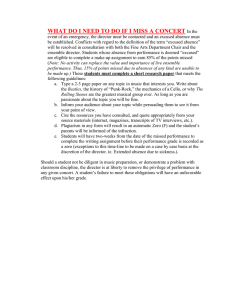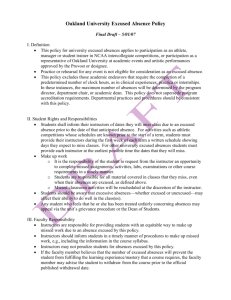Spring 2012_203_Syllabus 2
advertisement

THEATRE APPRECIATION SYLLABUS THEATRE 112 – SECTION 203 SPRING 2012 TR 11.00a-12.15p; HARRIS HALL 234 INSTRUCTOR: Adam D. Stephens OFFICE: PAC 227 OFFICE HOURS: by appt. PHONE: 304.543.0688 EMAIL: stephens38@marshall.edu COURSE TITLE: THE 112—Theatre Appreciation PREREQUISITES: None COURSE DESCRIPTION: An introduction to Theatre for the non-major designed to further an understanding and appreciation of the elements of dramatic performance and production technique as a form and means of creative/artistic expression. TEXTS (REQUIRED): Theatre: The Lively Art, Edwin Wilson and Alvin Goldfarb, McGraw-Hill, 7th Ed. Pride and Prejudice, adapted by Jon Jory, from the novel by Jane Austen MUONLINE: This course will utilize the university’s electronic platform to communicate and distribute supplemental material and grades throughout the eight weeks. PRINTING COSTS: Students should anticipate to spend about $7-10 on printing hard copies of out-of-class writing assignments, supplemental materials, and this syllabus. COURSE OBJECTIVES: - To explore the cultural and historical perspectives of theatre through an examination of the major periods of dramatic literature. - To develop an understanding of the basic elements of dramatic structure. - To identify the important styles and genres of drama. - To examine the role of the actor, director, playwright, designers, technicians and audience in a theatrical production and increase an awareness of the performance process that makes theatre the most interactive form of artistic expression. -To utilize this knowledge through the attendance and critical evaluation of theatrical productions and performance opportunities. -To generate excitement about theatre and theatrical productions. ADD’L MATERIALS: You will need at least three (3) large blue books for exams. COURSE POLICIES, PROCEDURES AND EXPECTAIONS PROFESSIONALISM: If you worked at Starbucks you would be a Barista and your responsibilities would include making coffee and a variety of other beverages for customers; if you failed to do so you would be fired. If you worked at a law firm as a defense attorney and failed to keep your clients out of prison you would quickly be let go. At university you’re a student, and your responsibilities are to attend class, to perform assigned tasks and to learn. It is in this instructor’s opinion that you should treat your role as student just as you would any professional position, either in the public or private sector. Such an approach includes behaviors like: being early, wearing appropriate attire, actively participating in lectures (by asking pertinent questions and taking notes) discussions or activities, respecting your colleagues and by adhering to policies and standards of conduct. (Note: it doesn’t hurt to have a good sense of humor either.) There are two sides to every coin: With all that being said I, as your instructor, will strive to fulfill my role in a professional manner as well. I approach every endeavor with excitement, respect, dedication and the expectation that I will inevitably grow and change as a result of being involved in it; this class is no exception. I expect to meet and interact with a variety of individuals all with unique experiences, perspectives and interpretations. I respect and learn from these interactions, I urge you to do the same. METHODOLOGY: Class sessions will consist of lecture and open discussion. Video supplements and handouts will also be used enhance the primary course material (the text book). Students will be graded on all assigned coursework, which appears in multiple forms: Class Participation=100 pts.—These points can be earned by participating in class discussions, asking pertinent questions and answering questions directed to you. (Also by not using your phone during class.) If you are absent, you obviously cannot participate. Play Assessment=100 pts.—We will all be reading a play together and using it as a text to which we refer throughout the semester. After finishing the reading you will be tested on the facts and details of the play. You will also be asked about your interpretation of its themes and meanings as well. This exam will also serve to introduce you to the format of assessments for this course. In-class work=100 pts.—We will occasionally break into groups to do work or have a simple response assignment during our meeting time. This will all be collected and scored based on its specific requirements. Quizzes=100 pts.—We will have about one per week, occasionally more. These are unannounced and cannot be made-up due to absences. (Excluding university excused absences.)They are to assess your understanding of homework and reading assignments. Attending Performances=100pts. (50 pts. each)—As a part of this course you are required to attend Marshall University Theatre Department performances. Performance Review=100 pts.—Simply attending a performance earns you points, but you are also required to write a review. Specific instructions will be provided. Midterm Exam=200 pts.—This exam is designed to evaluate your understanding of concepts, ideas, terms and activities covered in the first half of the course schedule. It will also include your response to the first MU production. Final Exam=200pts.—This exam is designed to evaluate your understanding of concepts, ideas, terms and activities covered in the second half of the course schedule. It is also your opportunity to provide specific feedback to the instructor. ATTENDANCE: Attendance is mandatory. Your presence will be recorded every session. In order to be considered present you must be in your seat ready to work at the beginning of the established class meeting time; and remain in class until it is dismissed (respites excluded). Three unexcused absences will be permitted with no penalty; however, make note that missed quizzes are only allowed to be made-up if the student can furnish a University Excuse (see university policy below). Any unexcused absences above the permitted three will result in the loss of 20 points for each additional day absent. In the event that the instructor cancels class, there will be no penalties. GRADING: Distribution: Play Assessment……………… 100 points Scale: A = 900-1000 In-class Work………….………..100 points B = 800-899 Class Participation…………….100 points C = 700-799 Performance Attendance…100 points D = 600-699 Performance Review..………100 points Quizzes……………………………. 100 points Midterm Exam.…………………200 points Final Exam………………………..200 points Total…………………………….1000 points *Extra Credit: GROUND RULES: Syllabus Receipt………………..10 points Play Report.………………………25 points MAS Features………………….. 25 points (ea.) Perform……………………………50 points Use of cell phones, mp3 players or any such devices during class time is strictly prohibited. Any violation of this policy results in a forfeiture of your class participation grade for that day. Any further violation and you will be asked to leave the classroom and will be counted absent for that day. All electronic devices must be silenced and stowed during instruction time. If your phone rings during class, simply silence it immediately and as discreetly as possible. If extenuating circumstances arise (i.e. you are expecting an urgent/emergency call) notify me before the beginning of the class session and you can set your phone to “vibrate” and then discreetly take the call in the hallway. If you don’t understand given directions/instructions/homework/etc. do not wait until the last possible moment to ask me for clarification. Ask as soon as you’re sure you don’t get it (email, or call if need be). Assignments which are not turned in on time will be penalized 10 points for every calendar day late. Please: If you have any concerns or questions feel free to ask at any time. Theatre is fun, let’s try and make it so. THEATRE DEPARTMENT POLICIES BUILDING POLICIES: Use of personal electronic devices (IPod, mp3 player, computers, cell phones, etc.) is not allowed on Joan C Edwards Playhouse stage areas (stage floor, grid, and production booth) at any time or in the Francis-Booth when designated as a production area. Use of personal electronic devices in all production areas during rehearsal, work calls, crew watch or after half hour (performance) on the stage, backstage (including Green Room), auditorium, or front of house is allowed only if permission is granted by the area supervisor and the stage manager is notified prior to use. Use of personal electronic devices in class is by permission of the instructor. Footwear: Safety regulations require that appropriate footwear be worn at all times in all production work areas of the Performing Arts Center theatre facility. Flip flops, fashion high heels, open toe shoes, bedroom slippers or any footwear judged by the area supervisor to be a safety hazard are not allowed at any time in the stage areas, scene shop, costume shop, and lighting lab or anywhere in the Edwards Playhouse during a production class, work call, or rehearsal. Costume and dance footwear is allowed in specified areas during rehearsal or performance only. The Frances Booth Experimental Theatre may also be designated as a production work area. UNIVERSITY POLICIES EXCUSED ABSENCE: If a student is absent from class because of a circumstance that is included in the excused absence policy, the absence can be handled by an arrangement between the student and the instructor or, if either party requests, the student can obtain an official excused absence following the procedure below. The instructor must honor a university excused absence covered by this policy and allow the student an opportunity to catch up / make up work missed. This policy excludes those academic endeavors that require the completion of a certain number of clock hours, as in clinical experiences, practica or internships. For those courses, the maximum number of absences will be determined by the department chair or program supervisor. This policy does not supersede program accreditation requirements. Excused absences fall into five categories: (1) University-Sponsored Activities (2) Student Illness or Critical Illness/Death in the Immediate Family "Immediate Family" is defined as a spouse/life partner, child, parent, legal guardian, sibling, grandparent or grandchild. a. Student Illness or Injury: Absences will be excused only for illnesses or injuries that prohibit students from participating in class. b. Critical Illness of Immediate Family Member: Absences will be excused if the student documents that he or she had to provide needed care and/or support for a critically ill immediate family member. c. Death of an Immediate Family Member (3) Short-Term Military Obligations. (4) Jury Duty or Subpoena for Court Appearance: This applies to absences that are a result of official requests from a court of law. (5) Religious Holidays: This applies to religious holidays. Process to Secure an Excused Absence: The student who seeks an excused absence must do so immediately after the event/activity/incident by following these guidelines. Whenever time permits, such as for University activities scheduled well in advance, the excuse must be obtained and presented to the instructor prior to the absence. 1. University Sponsored Activities: a. Academic Activities: These absences are excused by the dean within whose unit the activity is sponsored. the dean must pre-approve any notice that is given or sent to faculty regarding absences of this type. 2. Student Illness or Critical Illness/Death in the Immediate Family: a. Student Illness or Injury: The student must submit official documentation of treatment by a medical practitioner to the Dean of Student Affairs as soon as he/she returns to class. Documentation must specify the inclusive dates to be excused. The dean will notify faculty that the absence(s) meets the criteria to be excused. b. Critical Illness of Immediate Family Member: The student must submit official documentation from the family member's health care provider that substantiates the critical nature of the illness and the student's need to provide the care/support. This documentation is to be submitted to the Dean of Student Affairs upon the student's return to class. The dean will notify faculty that the absence(s) meets the criteria to be excused. c. Death of an Immediate Family Member: To obtain an excused absence, the student must submit one of the following to the Dean of Student Affairs upon return to classes: an obituary or funeral program with the student named as a relative; verification on letterhead stationery of the death and the relationship by clergy or funeral home personnel. The dean will notify faculty that the absence meets the criteria to be excused. 3. Short-Term Military Obligations: The student who seeks an excused absence for military obligation must present official documentation of his/her orders to duty to the dean of his/her college prior to the absence. The dean will notify faculty that the absences are to be excused. 4. Jury Duty or Subpoena for Court Appearance: The student who seeks an excused absence for jury duty or court appearance must submit his/her subpoena or official notification of jury duty to the dean of his/her college prior to the date of the obligation. The dean will notify faculty that the absence is to be excused. 5. Religious Holidays: Process to Catch Up / Make Up Missed Work: 1. It is the responsibility of the student to request an opportunity to complete missed work. 2. Once the excused absence has been secured, the request to make up work should be made to the instructor at the next available class meeting. 3. Missed activities will be rescheduled or, in the event that rescheduling of an activity is not practical or possible, a fair and equitable alternative way of arriving at the grade for the missed component of the overall grade will be developed by the instructor. 4. Punitive measures must not be taken against students who present an official University excused absence. 5. Students should be aware that excessive absences--whether excused or unexcused--may affect their ability to earn a passing grade. 6. If the faculty member believes that the number of absences accrued under the terms of this policy is such that the student cannot fulfill the learning experience/mastery that a course requires, he/she may recommend that a student withdraw from the class. Regardless of the nature of the excused absence, the student is responsible for completing all coursework prior to the end of the semester. CANCELLED CLASS: If class is cancelled by your professor, you will be notified by the department via email and the department secretary will attempt to call you at the phone number on file in the Theatre office. Course cancellation will also be posted on the door of your classroom prior to class time. INCOMPLETE: The grade of I (incomplete) indicates that the student has completed three-quarters of the course, but cannot complete the course for a reason that accords with the university excused-absence policy. Students must be in good standing in the class prior to requesting an incomplete. The course instructor decides whether or not an incomplete will be granted and specifies in writing what work the student must complete to fulfill the course requirements. The student has until the end of the next fall or spring semester from the date of receipt of the incomplete grade in which to complete the course, or the instructor may establish an earlier 7 deadline. If special circumstances exist, which prevent the student from completing the course in the prescribed time, the incomplete may be extended with approval of the instructor, the instructor’s chair or division head, and the instructor’s dean. If the student satisfactorily completes the course in the prescribed time he/she will receive a letter grade. If the student fails to complete the course requirements during the stipulated time, the grade of I changes to a grade of F. ACADEMIC DISHONESTY: All students should be familiar with the university’s policy concerning academic dishonesty. This policy can be found on pp. 106 – 109 of the undergraduate catalog http://www.marshall.edu/catalog/undergraduate/ug_08-09_published.pdf or on pp. 59 – 62 in the 2008 online graduate catalog http://www.marshall.edu/catalog/Graduate/S2008/gr_sp08.pdf . (Faculty are encouraged to add any additional information specific to their expectations and/or rules regarding academic dishonesty in their class). POLICY FOR STUDENTS WITH DISABILITIES: Marshall University is committed to equal opportunity in education for all students, including those with physical, learning and psychological disabilities. University policy states that it is the responsibility of students with disabilities to contact the Office of Disabled Student Services (DSS) in Prichard Hall 117, phone 304 696-2271 to provide documentation of their disability. Following this, the DSS Coordinator will send a letter to each of the student’s instructors outlining the academic accommodation he/she will need to ensure equality in classroom experiences, outside assignment, testing and grading. The instructor and student will meet to discuss how the accommodation(s) requested will be provided. For more information, please visit http://www.marshall.edu/disabled or contact Disabled Student Services Office at Prichard Hall 11, phone 304-696-2271. UNIVERSITY COMPUTING SERVICES’ ACCEPTABLE USE POLICY: All students are responsible for knowing this policy, which can be found on the web at http://www.marshall.edu/ucs/CS/accptuse.asp. AFFIRMATIVE ACTION POLICY: This course will follow Marshall University’s policy on Affirmative Action, which can be found on p. 93 of the 2008-2009 undergraduate catalog http://www.marshall.edu/catalog/undergraduate/ug_0809_published.pdf or on pp. 16-17 of the 2008 graduate catalog http://www.marshall.edu/catalog/Graduate/S2008/gr_sp08.pdf. Specifically, all students will be afforded equal opportunity without regard to race, color, sex, religion, age, disability, national origin, or sexual orientation. Week 1 2 3 4 5 6 Day/Date Session Topic Corresponding Resources T- Jan. 10 Course Introduction Syllabus R- Jan. 12 Discuss Act 1 of Pride and Prejudice Script, pp 9-50 T- Jan. 17 Discuss Act 2 of Pride and Prejudice Script, pp 51-82 R- Jan. 19 Discuss Pride and Prejudice/ Take Exam Script T- Jan. 24 What is Art?/Why go to the theatre? Chap. 1 R- Jan. 26 Drama Mamet handout/ UNC handout T- Jan. 31 Theatre in Everyday Life Chap. 2 R- Feb. 2 The Audience Chap. 3 T- Feb. 7 Creating the Blueprint Chap. 4 R- Feb. 9 Theatrical Genres Chap. 5 T- Feb. 14 Online Script/Handouts T- Feb. 21 Discuss Proof, Audience Etiquette and How to Take Performance Notes Discuss MU Production & Requirements for Response Acting for the Stage R- Feb. 23 In-class Acting Activity Pride and Prejudice Script T- Feb. 28 The Director and Producer Chap. 7 R- Mar. 1 Theatrical Spaces Chap. 8 T- Mar. 6 Review for Midterm R- Mar. 8 Midterm Exam T- Mar. 13 Designers: Scenery and Costume Chap. 9 R- Mar. 15 Designers: Lighting and Sound Chap. 10 T- Mar. 20 Spring Break—NO CLASS R- Mar. 22 Spring Break—NO CLASS T- Mar. 27 In-class Analysis Activity R- Mar. 29 Theatre History: Greek, Roman, Medieval R- Feb. 16 7 8 9 10 11 12 Reminders Friday is last day of Add/Drop Bring Blue Book. Access these via MU Online MU Theatre Production of Proof Feb. 15-18 Chap. 6 Bring Blue Book. Chap. 11 13 14 15 16 T- Apr. 3 Theatre History: Renaissance Chap. 13 R- Apr. 5 Shakespeare’s Language and Psychology Handouts T- Apr. 10 Film Viewing Classroom Technology R- Apr. 12 Film Viewing Classroom Technology T- Apr. 17 Theatre Tour Review Theatre Dept. Policies R- Apr. 19 Discuss Pride and Prejudice and details for Review T- Apr. 24 Early Modern Theatre & Global Theatre Chap. 15 & 16 R- Apr. 26 Today’s Diverse Theater Chap. 17 MU Theatre Production of Pride and Prejudice Apr. 18-21 FINAL EXAM: Thursday May 3, 10.15a-12.15a (Bring Blue Book) SYLLABUS RECIEPT I, ______________________________________, have received, read and understand the contents of this syllabus; and will furthermore adhere to the policies, procedures, standards and expectations therein. ___________________________________ Signature ___________________________________ Date





